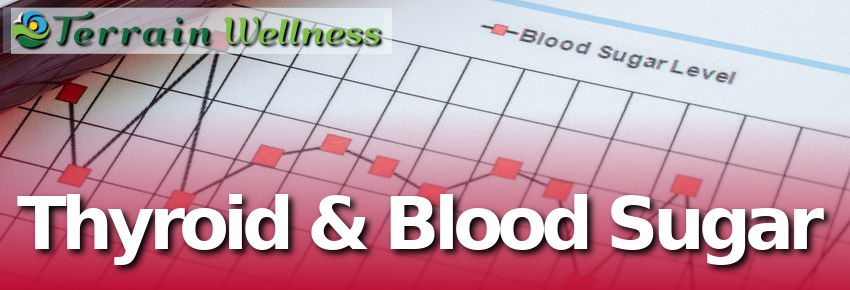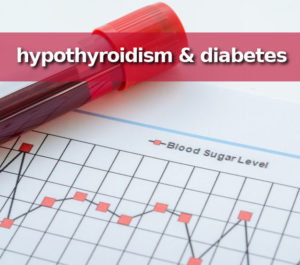Thyroid and blood sugar fluctuations

- Hypothyroidism and Diabetes
- What causes thyroid & blood glucose problems?
- Hormone imbalance in lean, active people
- Gut Health, Foods & Lifestyle
- Yogurt’s dirty little secrets
- Simple gut health principles
- Conclusions
Table of Contents:
Most people are aware that sugary foods are unhealthy and that imbalanced carbohydrates are tied to unwanted weight gain. However, what some people do not know, is that blood glucose problems created by excess carbohydrates wreak havoc on proper thyroid function. Blood sugar spikes and crashes from foods like bread, pasta, sugar and desserts can cause or exacerbate autoimmune thyroid conditions like Hashimoto’s Disease. Making matters worse, thyroid dysfunction, in turn, causes more glucose regulation issues. Insulin is the hormone that lowers glucose levels in the bloodstream. “Insulin Resistance” is when the body stops listening to those signals, paving the way to Type 2 diabetes. Hypothyroidism is one of the causes of that diabetes inducing insulin resistance.
Hypothyroidism and diabetes
These hormone patterns become a vicious circle that is self-reinforcing, creating what scientists call a positive feedback loop. While the term “root cause” has become vague and cliche, today we are going to describe the specific, fundamental principles that make-or-break thyroid and blood sugar regulation. As medical research clearly shows, hypothyroidism and diabetes are closely linked together. Now knowing that hypothyroidism and diabetes can be connected, we now have the power to do something about it.

Having briefly described the pattern where specific lifestyle and eating habits create a cycle of ever-increasing endocrine imbalance, one may feel like there’s no way out. But, the good news here is that breaking this positive feedback loop is very possible, if the right steps are taken. Given that it is in fact a loop, one could (in theory) break the loop at any point along the causal chain. But, as we will discuss shortly, some ways of breaking this loop are preferable to others. As life has taught me on a multitude of occasions, the “easy way” is almost never the “right way”.
Read on to learn the physiology behind these hormone issues and some simple things you can do about them.
Breaking the Hypothyroidism and Diabetes Cycle
- Lifestyle choices & a high carbohydrate diet cause blood glucose to boom & bust
- Glucose boom & bust cycles increase cortisol, a stress hormone
- Too much cortisol causes hypothyroidism
- Hypothyroidism causes insulin resistance
- Insulin Resistance causes higher glucose in the bloodstream
- High glucose levels causes the body to release more insulin
- More insulin causes glucose to crash, creating sweets/carb craving
- Vicious circle: sugar/carb cravings send you back to step #1
- Beware: sugar-free sweeteners still produce an insulin response even though they are calorie-free, so they still reinforce this unhealthy pattern
Hypothyroidism and Hypoglycemia
Trapped: patients become addicted to sugar and carbohydrates while doing continual endocrine damage. This pattern is a common cluster of symptoms in patients.
The easy way is one you’re probably already familiar with: prescription pharmaceuticals. But, the problem with prescription drugs like Synthroid and anti-diabetic drugs like Metformin/Glucophage is that they artificially bring your body back into alignment without addressing the conditions that led to the problem to begin with. With prescription medications used to treat hormone imbalance, a drug is used to either boost or suppress certain hormones back to their healthy levels. But, simply getting one’s hormones back to a healthy level is not the same thing as actually being healthy. As any diabetic can attest, simply taking insulin or glucophage and continuing life as normal won’t really solve the underlying conditions. Similarly, a prescription for Levothyroxine won’t actually fix your thyroid. That is because these drugs don’t address the complex conditions that led to thyroid and glucose regulation problems. These medications can best be viewed as temporary measures that, while I may prescribe in serious cases, are definitely not solutions.
Since the quick fix of medications only addresses the problem without eliminating the causal factors, the problem will come back even worse in the future. Those who rely only on medications to solve their endocrine imbalances enter a new vicious circle where continually higher doses of medication result in increased side effects and decreased benefits.
Featured Article: Epstein Barr Virus and Thyroid
What causes thyroid and blood sugar problems
So where does that leave us? Taking a medication and going on with our lives is easy, but it’s not a true solution. To effect lasting change, we must first realize that the problem is created by our individual genetics interacting with our lifestyle choices. New medical research into genetics verifies what many have thought for years: it’s harder for some people to lose weight. What this means is that some people will efficiently process carbs while others efficiently process fats (there’s also a small number of people who can process either efficiently). No matter which genetic camp one falls into, balanced fats, proteins and carbohydrates are essential to a proper nutrition plan.
Those who do not efficiently process carbohydrates (about 45% of the population) tend to gain weight quickly when they eat carbs. For these people, limiting carbs and sugar will be very important to maintaining proper endocrine balance and overall health. If you are one of those people, I can relate to you, because I myself function much better on limiting my carbohydrate intake. Those in this group will still need some carbohydrates, but may need to reduce carbohydrate intake more than others.
There is another 40% of people that can eat carbs without significant weight gain, but will quickly gain weight on a high fat nutrition plan. For those in this camp, I would caution them to make sure they get enough fat and cholesterol in their nutrition because they are crucial for hormone production. Also, just because carbs don’t result in weight gain for a particular person doesn’t mean they are immune to the negative effects of blood glucose spikes. Choosing carbohydrates that are lower on the Insulin Index (produce less of an insulin response) will also be of value for those who efficiently burn carbs.
Hormone Imbalance in Lean, Active People
- Those with very little body fat may be unable to produce sufficient hormones: fat and cholesterol are the building blocks of hormones. Without those building blocks, hormone levels drop.
- Carbs are converted into energy very quickly, leading to frequently feeling hungry. This need to eat frequently on a very low-fat diet is reflected the very jagged pattern of hormone-damaging blood glucose spikes and crashes throughout the day.
- Continual, jagged glucose spikes puts excessive wear and strain on the endocrine system over time, even among people who lead an active lifestyle.
- BEWARE: some low Glycemic Index foods produce an oversized insulin response. Choose carbs based on a low Insulin Index instead, because this chart compares the hormonal compensation needed balance glucose levels in the bloodstream after eating certain foods.
- People need enough fats, cholesterol and protein in their nutrition plans so they can dampen their glucose spikes/crashes. Fats and cholesterol are also necessary building blocks for healthy hormone production
The last 15% of people won’t easily gain weight on excess carbs or fat. However, whether or not carbs cause gain weight based on one’s genetics or not, the dangerous pattern of spiking blood sugar and increasing hormonal imbalance can happen to anyone. Those most especially at-risk are people with a family history of diabetes or other endocrine dysfunction. For this group, choosing carbs that are lower on the Insulin Index will provide fuel for life while limiting insulin response.
While many generally link weight directly with health, this may not always be true. There are many cases where very lean, active and athletic people can develop hormone imbalances. Further complicating matters, many on traditional athletic or vegan diets may notice increased health, athletic performance and vitality for several years. People on these strict nutrition plans often feel better at first because it causes one to avoid a bunch of junk food while eating a lot more healthy, plant-based foods. But, that’s not the end of the story. Many people who go vegan or adopt a low-fat athletic diet lose weight and feel a lot better. In the long run, their body’s slowly spend all of their natural reserves of hormone-building fats, cholesterol and B-Vitamins. Also problematic, foods in these diets can be higher in carbohydrates, when compared to other meal plans. Strict, low-fat athletes often see a plateau in their performance gains due to unhealthy blood sugar cycles wherein they need to eat every few hours, feel “hangry” (hungry + angry) often and are also depleted of hormone-building fats and cholesterol. For these reasons, I see many otherwise healthy, long-term vegans and athletes present with hormone imbalances that the patient may not suspect because their diet worked so well for them in the past.
Gut Health, Nourishing Foods & Lifestyle
Naturally rebalancing the endocrine system is possible for almost everyone. While total transformation can take time, patients will likely start seeing positive changes in as little as a few days to a few weeks. However, please keep in mind that it took years for the imbalance to develop so patience with the process is needed. When considering natural solutions for thyroid and blood sugar balance there are three factors within our control: choosing nourishing foods, rebuilding gut health and our lifestyle.
Insulin Index, Gut Flora & Physical Movement:
The Insulin Index is a food chart that indicates how different foods affect insulin levels in the body. In contrast, the Glycemic Index shows how foods affect blood sugar, but not what those foods do to the more important Insulin Response. For patients seeking better hormone balance, I often recommend choosing foods lower on the Insulin Index rather than the Glycemic Index because this is the most direct natural way to start taking control of one’s endocrine responses and start the process of undoing the dangerous process of insulin resistance.
- Lactose in dairy is a carb
- Fruit added to yogurt is a carb
- Most yogurt has tons of added sugar so it’s up with candy on the Insulin Index
Yogurt’s dirty little secrets:
The Lowdown: while plain yogurt has some beneficial properties, the yogurt consumed by most Americans is so overloaded with carbs and added sugar that it may do more harm than good
While most people are aware that the foods we eat affect our health, fewer understand how the millions of bacteria that live in our digestive tract influence our health positively or negatively. Overgrowth of the types of gut bacteria that break down carbohydrates is tied to inflammation, autoimmune conditions and heart disease. Inflammation and autoimmune symptoms caused by imbalanced gut flora are like a second-wave attack on the thyroid already compromised from imbalanced blood sugar.
Unfortunately, the common medical advice for gut health is to eat yogurt for the probiotics. The problem is, what most consider “yogurt” contains the carbohydrate lactose and is then loaded up with fruit and sugar/corn-syrup. Loaded down with all those extra carbs, yogurt may actually create more gut health problems than it solves. Not only this, but dairy can also contribute to excess phlegm and inflammation.
Probiotics for digestive health have recently become mainstream. But, what more people need to realize is that the totality of our nutrition is what will have the largest effect on gut health. Despite products like yogurt and probiotic supplements flooding the market, there has been very little information for the general public about just how much we can transform gut health via what we feed our microbiome.
- Balance carb intake by incorporating plenty of protein and some fats into your nutrition plan
- Too many carbs cause an overgrowth of gut bacteria correlated with heart disease, inflammation, autoimmune disease & thyroid problems
- Choose slow burning carbs (low on the Insulin Index) to reduce damaging blood-sugar peaks and crashes
- Eat a variety of vegetables daily for nutrition & to feed more healthy gut flora
- Physical movement helps a lot
- Beware: Yogurt has probiotics, but is often stuffed with carbs/sugar
- Beware: antibiotics kill off healthy gut flora
Simple Gut Health Principles
Medical research shows that diets that are too high in carbohydrates or fat can negatively affect the delicate balance of our gut microbiome. When we eat food, we are not the only ones doing the eating. Inside our digestive tract, countless beneficial bacteria aid in the digestion of the foods we consume. Some bacteria help break down sugars, others fats and proteins. Because each type of bacteria helps digest certain types of food, some types of bacteria will become much more prevalent while others will decline in numbers, depending on the balance of foods eaten.
Each type of natural gut flora affects our health in a different way. For example, the “Western Diet” of processed foods high in refined carbohydrates and saturated fat feeds gut bacteria known to cause inflammatory conditions, endocrine imbalance, heart disease and autoimmune conditions. Gut health is very complex, and we’ve only just scratched the surface. But, hopefully this has provided enough insight to make some healthy changes that will produce noticeable results.
Movement is life. Rather than focusing on exercise that may seem like a chore, or something that doesn’t fit with their lifestyle, I like to incorporate movements that align with the life that I want to live. Find a way to move that is enjoyable and/or rewarding in some way and stick with it. Physical movement improves the body’s response to insulin, lowers blood sugar, lowers thyroid-damaging stress hormones, improves mood and increases quality of life. If exercise is your thing, go for it! If not, find activities that involve physical movement that you enjoy and incorporate those activities into a daily and weekly routine.
Conclusions
Thyroid and blood sugar are closely related in that glucose dysregulation causes hormone imbalances that create a positive feedback loop leading to hypothyroidism and insulin resistance. This vicious circle of declining health can culminate in autoimmune conditions like Hashimoto’s disease as well as diabetes. While prescriptions can technically break this cycle, drugs are a quick fix that do not remove the underlying problems that lead to endocrine imbalance in the first place.
The best general approach for long-term endocrine balance is to limit carbs, choose slow-burning carbs while getting plenty of calories from fat and protein. Also be sure to incorporate lots of non-starchy vegetables and physical movement daily. If you are a person that performs well on carbs, still be sure to choose carbs that are low on the Insulin Index whenever possible. By adhering to these principles, we improve the entirety of our physical health and especially our endocrine system.
Yours in health,
Dr. Danielle Lockwood




